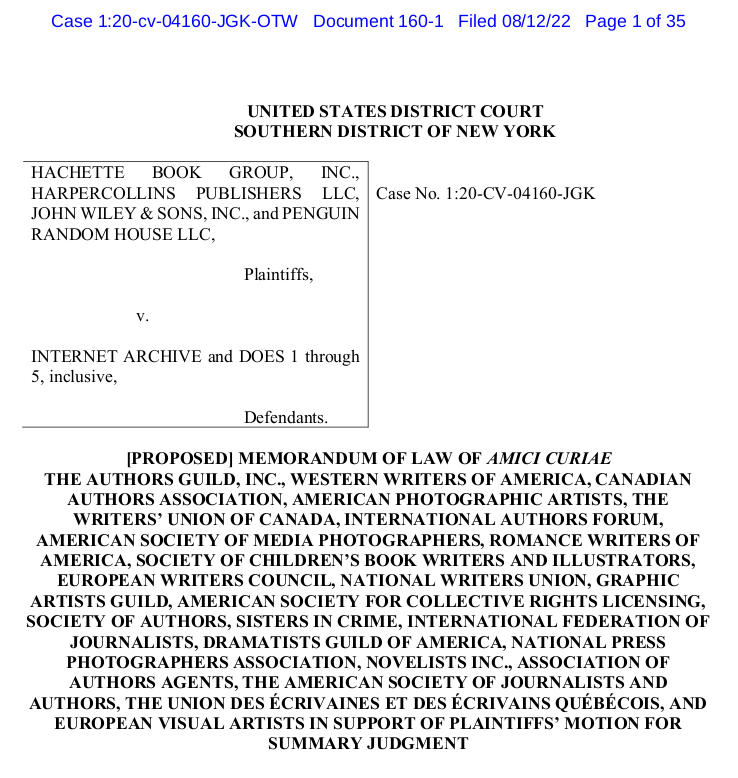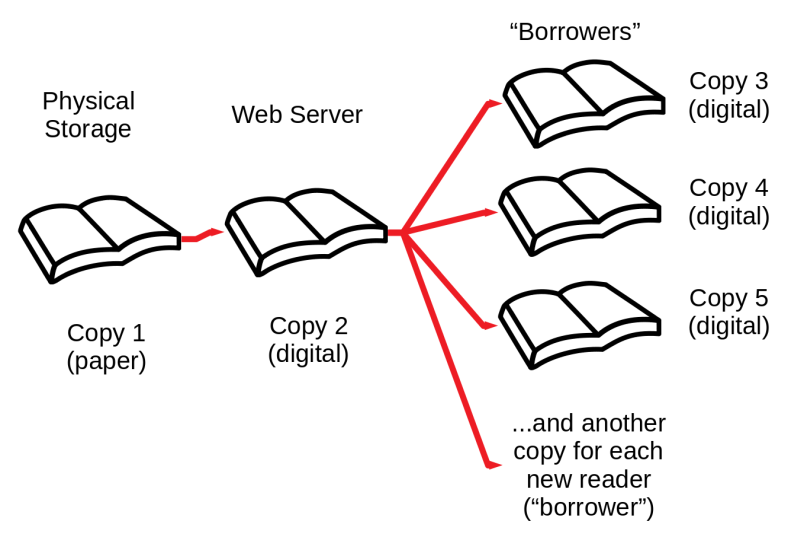 Reaffirming our longstanding objections to the Internet Archive’s distribution of unauthorized digital copies of books in which our work has been published, the NWU has joined almost two dozen national and international organizations of writers, photographers, and visual artists in a friend of the court brief in opposition to the Internet Archive’s book-scanning and so-called Controlled Digital Lending.
Reaffirming our longstanding objections to the Internet Archive’s distribution of unauthorized digital copies of books in which our work has been published, the NWU has joined almost two dozen national and international organizations of writers, photographers, and visual artists in a friend of the court brief in opposition to the Internet Archive’s book-scanning and so-called Controlled Digital Lending.
Our brief, submitted on Friday, August 12, 2022, in Federal court in New York, explains how Controlled Digital Lending [sic] and the practices of the Internet Archive violate our copyrights, divert readers from authorized digital editions of our work, and undermine our (already precarious) incomes.
The brief from the NWU and allied organizations of authors was filed in a lawsuit brought against the Internet Archive in 2020 by four major book publishers. Our brief supports the publishers’ motion for a finding by the court that the Internet Archive’s actions constitute copyright infringement:
Defendant Internet Archive (“IA”) has engaged, and continues to engage, in willful infringement of Plaintiffs’ copyrighted literary works… on a massive scale. Through its so-called Open Library program (“Open Library”), IA has created a vast unauthorized online database of literary works that anyone in the world can access for free, which differs from the most flagrantly illegal pirate websites chiefly by reason of its enormous scale. IA has reproduced and distributed digital copies of these works under the pretext that it is merely a library, loaning “books” to its patrons by means of a process it refers to as controlled digital lending, or “CDL” – which in reality is neither controlled nor limited to lending.
This lawsuit was brought by publishers, not by authors. The NWU had no advance knowledge that the lawsuit would be filed, and has not been consulted by any of the parties to the lawsuit or their lawyers.
Just days before the publishers’ lawsuit was filed, the NWU arranged and moderated the first and to date only meeting between the Internet Archive, its leading apologists, and their critics. The NWU and other victims of so-called “Controlled Digital Lending” continue to “appeal for a dialogue among writers, authors, publishers, and librarians on how to enable and create the digital libraries we all want, in ways that fully respect authors’ rights.” The publishers’ lawsuit has in no way reduced our desire for that dialogue. If anything, it has made it more important than ever.
Since authors are not parties to the lawsuit, it was important for creators of books’ written and visual content to submit this friend of the court brief to make clear to the court how the Internet Archive’s book piracy adversely impacts our incomes as much as, and possibly more than, those of publishers. “Amici have a special interest in this case as they are all organizations that represent the professional interests of writers and other creators,” the authors’ organizations argue, “as well as a perspective… that can assist the Court beyond that of what counsel for the parties is able to provide.”
IA’s infringements have caused and will continue to cause significant harm to Amici’s members. Many members’ works are part of the “long tail” of older published works that earn much of their revenue from licensed electronic uses rather than sales of new copies…. [T]he works that IA has unilaterally deemed unworthy of full copyright protection are the very ones whose creators will be most significantly harmed by IA’s willful and widespread infringement. Further, creators and their publishers will find it more challenging to bring older titles back into print, whether in physical or electronic form, if they must compete with free Open Library-generated ebooks from IA….
If IA’s arguments in this litigation were accepted, any author or other creator who conveyed to a publisher the right to sell print copies of a work of authorship would, de facto, be granting IA and other online self-titled or actual libraries the right to reproduce and distribute that work in electronic form, as an unintended third-party beneficiary of the grant of print rights….
The Copyright Act instead rejects any such mandatory bundling of print publication rights and other economically significant rights. There is no compulsory license for digital derivatives of literary, pictorial or other works of authorship, let alone one that is triggered simply by virtue of print publication of such works…. IA’s offering unauthorized derivative versions of ebooks through Open Library will significantly interfere with authors’ abilities to grant exclusive electronic text rights to publishers and other licensees. This material interference is not without financial consequence, as it would severely diminish the value of these rights for authors because authors will no longer have the ability to grant exclusive ebook rights to potential licensees and fully exploit their rights in each separate format, which in turn will result in a loss of market opportunity and revenue streams….
Open Library’s offering of ebooks serves as a direct substitute for authorized sales and licenses of ebooks….
Last and perhaps most importantly from authors’ perspective, Open Library’s practices, especially should they become widespread and unrestricted, will eradicate the market for authors’ bringing the books back into print after publishers have ceased selling their books and the authors have reclaimed their rights….
A vibrant market exists for books that are brought back in print, for resales of rights, and for reissues after titles have been retired from a publishers’ catalog. Amici respectfully ask the court to consider the implications of IA’s activities on this market, which may be smaller and less prominent than the traditional market for publishers’ books, but that is no less significant to author earnings.
IA’s activities harm authors both by substituting their potential income from publishers’ consumer sales and ebook licenses, and by substituting for ebook editions of books that publishers have ceased production (referred to as “out of print”) and the authors have brought back into print, or which they intend to republish. Authors generally rely on multiple revenue streams to pull together a living, and they are increasingly exploring new ways to revive out of print works when the rights have reverted to them, especially as ebooks. Yet IA denies this market even exists. It claims that copying and distributing “out of print” books is fair use, because unavailability of a book through normal trade channels means there is no market for the work, and hence there can be no harm to the author. This wanton assumption ignores the myriad ways in which authors reuse and reissue works that have gone out of print and to which publishers have reverted rights.
Self-publishing new editions of books previously published by trade publishers is an increasingly popular way to exploit reverted rights. Typically, the amount an author can expect to earn from the sale of a self-published copy, or even for a download of a single chapter or excerpt, is higher than their trade royalty from an individual sale. The author’s royalty for a new traditionally published print book is typically only 5-15% of the list price of the book…. From sales of publishers’ ebook and digital audio editions, authors typically get a 25% share of the net receipts. By comparison, authors can obtain as much as 35-70% from each sale of a self-published copy. Several models exist today—from self-publishing through Kindle Direct, Apple Books, Kobo to reissues by niche smaller publishers in genre markets and reading apps—for authors to reissue out of print books as new editions, and earn from them.
The authors’ brief is co-signed by many organizations of photographers and graphic artists as well as writers. The brief notes with respect to these creators that, “Reissuing previously published works to generate income is by no means restricted to writers. Reissued works is a substantial source of income for photographers, and artists, who license illustrations, designs, and photography for new uses.”
Licenses for use in books of illustrations and photographs, as well as for many short text works included in books, are typically nonexclusive. The same image, short story, article, or poem can be, and often is, licensed for use in multiple print and digital formats and editions, on its own or in conjunction with multiple combinations of other text and graphic works. A page of one of the pirate ebooks produced and distributed by IA, or a single Web page on Archive.org with an unauthorized copy of a page of a printed book (“One Web Page for Every Page of Every Book”), can contain the entirety of a work of photography, graphic art, poetry, flash fiction, or journalism. These unauthorized copies compete with, and can destroy the market for licensing of these works for use on, all other authorized Web sites and printed and digital editions that include the same works.
The authors’ brief was co-signed by the NWU, The Authors Guild, Western Writers of America, Canadian Authors Association, American Photographic Artists, The Writers’ Union of Canada, International Authors Forum, American Society of Media Photographers, Romance Writers of America, Society of Children’s Book Writers and Illustrators, European Writers Council, Graphic Artists Guild, American Society for Collective Rights Licensing, Society of Authors, Sisters in Crime, International Federation of Journalists, Dramatists Guild of America, National Press Photographers Association, Novelists Inc., Association of Authors Agents, The American Society of Journalists and Authors, l’Union des Écrivaines et des Écrivains Québécois, and European Visual Artists.
We thank the Authors Guild for coordinating preparation of this brief, and thank all of the organizations from North America and around the world who have joined us in in this effort to make the perspectives of writers, photographers, and artists known to the court that will make decisions critical to our ability to earn a living from our creative work, in a case in which we are not “parties”.


 NWU is the sole provider of IFJ Press Passes to freelance journalists in the U.S.
NWU is the sole provider of IFJ Press Passes to freelance journalists in the U.S.